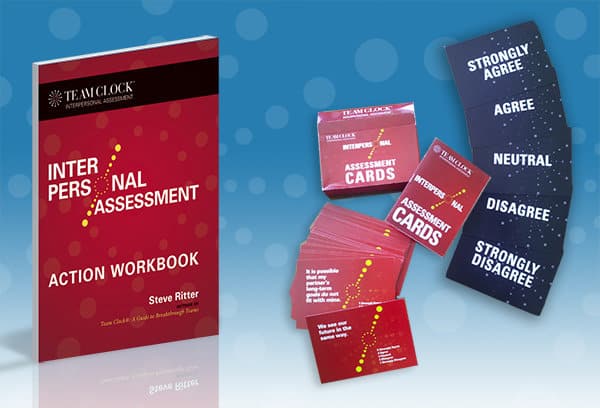Team Clock® Relationship Cycle
A new relationship begins with a stage of discovery where rules, roles, norms, and goals are defined. As the waters are tested, partners learn how conflict and differences are managed. Relationships at this stage are built on fun and desire. Discovery lays the groundwork for future adventure.
From there, partners move to a stage of intimacy where the walls start to come down. A foundation of trust and accountability is established. If this goes well, partners become more cohesive and grow attached. Relationships at this stage are built on openness. Increased closeness strengthens the bond for future trials.
The discovery and intimacy phases create a platform for the adventure stage. The connection now evolves to new levels. Relationships at this stage are built on exploration and experimentation. Adventure is the fulfillment of discovery’s hope.
The growth that has been created requires some adaptation in the space stage. This gives partners a chance to refuel. As the connection finds some distance, changes are negotiated and new circumstances are considered. Relationships at this stage are built on mutual respect. Healthy distance is safe if intimacy has been established. Eventually, this gives way to a renewed stage of discovery as the relationship refocuses on its future realities.
Over time, healthy relationships continue to cycle through evolving stages of discovery, intimacy, adventure, and space.
Quadrants and Domains
Relationships at this stage are testing the water. New couples take pleasure in sharing experiences and getting to know each other. Excitement builds as partners imagine what might lie ahead. In many ways, this is the fantasy stage.
Growth moves connections forward. Each partner matures while the relationship changes its shape. Issues, challenges, and opportunities get added to the connection altering the original picture.
Relationships at this stage are built on exploration. Adventure is the fulfillment of discovery. Now, the relationship is capable of growth that neither partner by themselves would have enjoyed.
Healthy distance is safe if intimacy has been established. For continuous growth to occur, closeness and distances must find a balance. The changes that arise from stretching the relationship need review.
Domain Overview
Norms, alignment, conflict, personal connection, respect, accountability, risk, leveraging difference, mourning, and refocusing: these are the vital anchors of strong relationships.
Beginning in the discovery phase, partners set their rules of engagement, find common direction, and learn how to disagree. As the intimacy phase unfolds, partners practice considerate exchange as their closeness grows more warm and familiar. During the adventure phase, the strength of this attachment allows the relationship to try new challenges and take advantage of the uniqueness of each partner. Finally, the space phase allows partners to let go of what’s changed and greet the new possibilities with fresh energy.
Interpersonal Assessment Package
As a package of resources, The Team Clock® Interpersonal Assessment provides a book, Useful Pain: Why Your Relationships Need Struggle, to teach the fundamentals of strong connections, a Card Sort to measure the health of your relationship, and an Action Workbook to help steer the conversations that will strengthen your connection. Together, the book, card sort, and action workbook will provide the tools you need to understand your relationships, evaluate their wellness, and move these connections forward.

